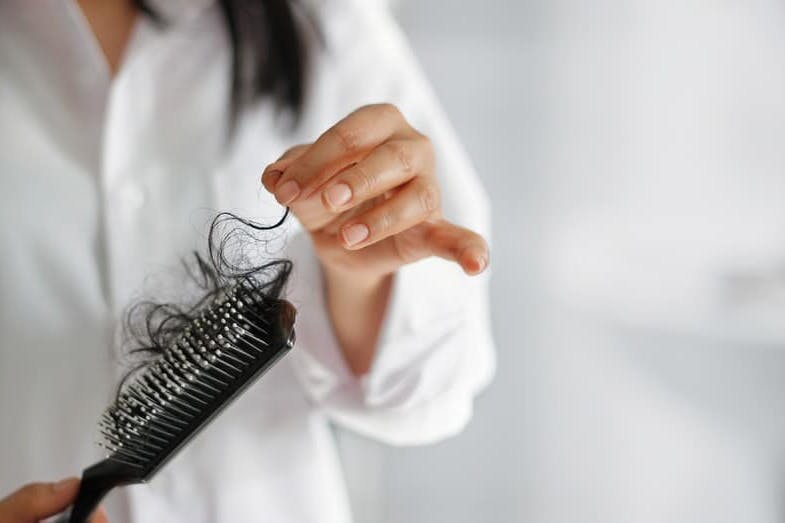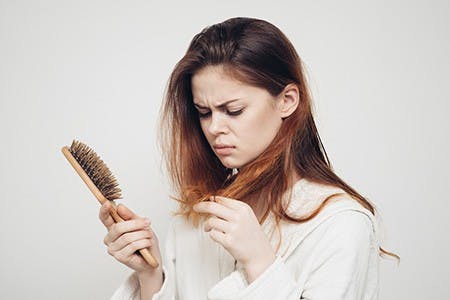Even if many people are working hard to loose a few inches around their middle, hearing the word “thin” is never desirable when it comes to your hair. But if you suffer from thinning hair, it is never too late to save your strands. The most important thing to understand is that it is never just one thing that’s causing you to lose your hair. Nutrafol reached out to 3 experts to see what they had to say about it.
Thinning Hair? We Talked To Experts About The Habits That May Cause It
7 Min Read

Get hair, health, and science news delivered right to your inbox.
“Many aspects of our lifestyle – from what we eat to how we style our hair – affect the strength of hair fibers,” says Dr. Alan Bauman.
Dr. Bauman is a Boca Raton-based hair transplant surgeon and physician and has been specializing in hair loss for many years.
“And that’s good news,” he continues. “Thicker hair is just about making a few simple tweaks to your lifestyle.”
But what habits are contributing to thinning hair?
1) Steamy showers
Oh, how we love those hot, steamy showers, especially when the thermometer drops.
“But hot water dehydrates strands [just like skin], leading to dry, brittle hair that is more prone to snap and fall out,” explains Ryan Welter, MD, a Boston-based hair transplant surgeon. “Not only are you washing your hair’s protective oils down the drain,” Ryan continues, “the heat also throws your scalp’s pores into overdrive to keep up with oil production, which can damage the root and lead to additional shedding.”
But you can avoid this by…
…lowering the temperature a few degrees. You can still take a warm shower but try to rinse your hair with the coolest temperature possible.

2) Using hot styling tools
Even though many of us live for our styling tools, the heat damages our hair when used too often.
“Scorching temps damage the proteins that make up your hair and its protective cuticle. Once the cuticle is damaged, the moisture balance is disrupted and your hair is more prone to breakage,” explains Dr. Alan Bauman.
But you can avoid this by…
…using but not over-using. Make sure to limit your hot tool usage by using it only two or three times a week. Instead of the hot setting, try to switch to the coolest possible. And always apply a heat-protection spray. Heat-protection spray’s creates a thermal barrier to reduce friction, which spares your hair from damages and any future thinning.
3) Unhealthy diets
When you set your body into starvation mood, you force it to direct its energy towards essential functions. Essential functions like helping your heart and brain work instead of making hair.
“In fact, when diagnosing anorexics, one of the top symptoms is severe hair loss,” says Dr. Paradi Mirmirani, a Vallejo, California dermatologist specializing in hair disorders.
But you can avoid this by…
…always eating a healthy diet with plenty of lean protein. Fish, chicken, lentils and beans are good dietary choices to avoid thinning hair and at the same time keep a healthy metabolism.
“Hair is primarily made of protein,” Dr. Mirmirani explains. It is the one thing that can make or break your hair if you are not getting enough. Aim for 46 grams per day (or about 25 to 30% of your total calories), to make sure you eat right. Round it off with a supplement designed to provide essential nutrients for your hair.
4) Treating wet hair wrong
Hair strands are most fragile when they are wet. They are prone to breakage when they are saturated with H2O since the protective cuticle is slightly raised. So if you are brushing your hair in the shower, stop immediately. Brushing it combined with rough towel-drying creates the perfect storm for snapping it off.
But you can avoid this by…
…brushing your hair before hitting the shower rather than when in the shower. Then blot (do not rub) the hair with a soft towel after your shower.